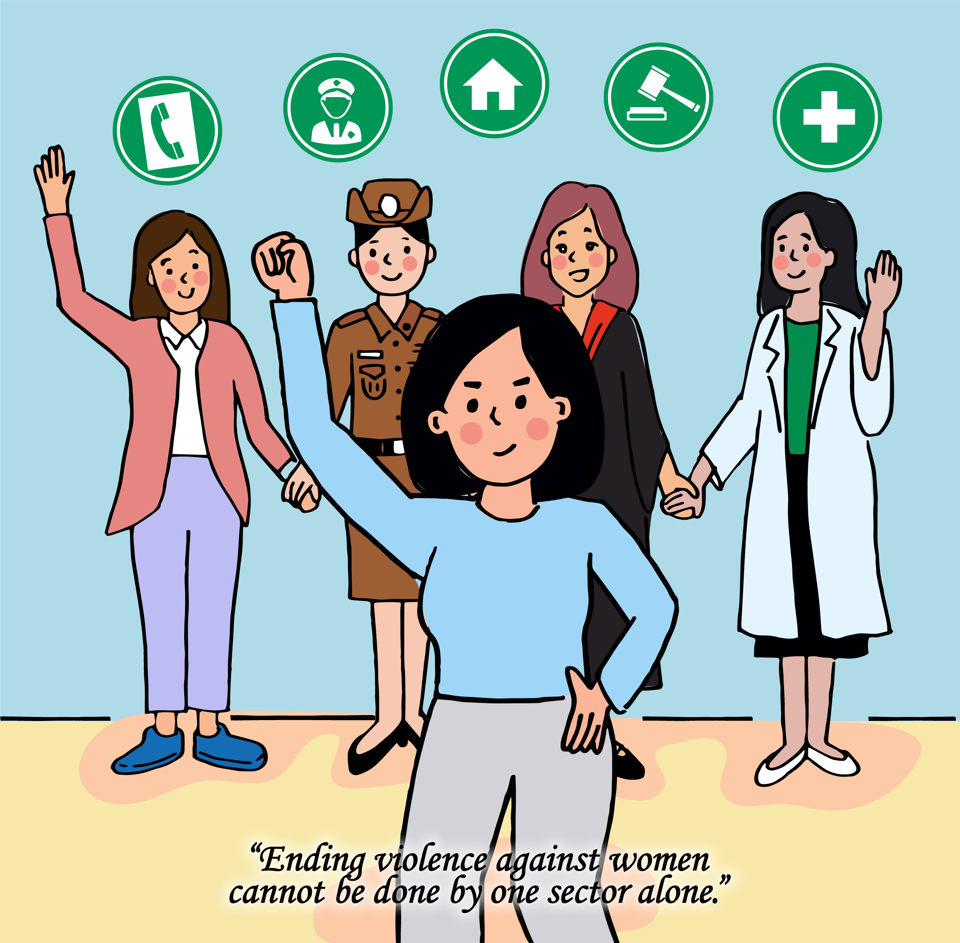Ending violence against women cannot be done by one sector alone
Interview with Sainatee Boonta, Operating Social Worker, One-Stop-Crisis Centre, Nakornping Hospital, Chiang Mai, ThailandDate:

The One Stop Crisis Centres in Thailand, administered by the Ministry of Social Development and Human Security, provide comprehensive services for survivors of violence. There are more than 100 OSCCs in hospitals across Thailand, supporting survivors to have access to immediate services and assistance. The centres provide physical and mental health treatment, legal assistance, and recovery and rehabilitation. Multidisciplinary teams support survivors of violence including women migrant workers.
Sainatee: Being a social worker for more than 10 years, I work at the forefront to help women and girl survivors of violence, regardless of their nationality. I joined the One-Stop-Crisis Centre (OSCC) in Nakornping Hospital in Chiang Mai as an Operating Social Worker more than two years before COVID-19 hit the country.
It was my dream to help women and children in need since I was a girl. Born and raised in the family of a village chief, I cannot resist helping others who have experienced injustice.
I am part of a multidisciplinary team that provides comprehensive services to all women survivors of violence, including women migrant workers. The services we provide include receiving complaints, providing medical support and psychosocial counselling, as well as referring cases and coordinating responses with other agencies – the duties that save the lives of survivors.
Before COVID-19, people who experienced violence would be able to come to the hospital to seek help. Although we have not seen a significant increase in the numbers of survivors coming to the hospital, that doesn’t mean that violence is not happening. Many of them are not able to come due to the lockdown and travel restrictions. As such, we need to adjust our services to include more remote services and outreach.
Frontline workers are usually overwhelmed with high demands, but during the pandemic, there have been even more challenges for both survivors and frontline officers. We are working with very limited resources in a challenging situation. We keep receiving new cases. In the end, it is the great team and the impact on our clients that make me continue. I felt very moved, for instance, when I learned that one young client - a 13-year-old migrant girl - has gradually recovered from sexual abuse committed by her stepfather. The third time that I saw her, I could see her smile with hopeful eyes.
For me, there are two factors of success: one is a great team leader like my supervisor, and the other is a great multidisciplinary network of service providers who have positive attitudes towards women migrant workers.
An integrated, coordinated system, as well as adequate resources, financing, and staff capacity, are required to build and sustain each essential service sector’s capacity in providing quality services that women need, including women migrant workers. All service providers require well-coordinated mechanisms and tools to respond to the needs of survivors.
I think that local and national Standard Operating Procedures (SOPs) should be developed to enhance coordinated services, as they help enhance understanding about the key principles of service delivery, as well as establish protocols for referrals and collaboration among service providers.
I believe that we should provide quality services to all survivors of violence with compassion and without discrimination. Moreover, we need to help the most vulnerable people first. With these principles, all survivors will be able to regain their lives and unlock their potential, especially women migrant workers who came to Thailand for a better future.
The ILO-UN Women programme “Safe and Fair: Realizing women migrant workers’ rights and opportunities in the ASEAN region”, under the global EU-UN Spotlight Initiative to eliminate violence against women and girls, supports front-line service providers to ensure essential services are available for women migrant workers who are subject to violence. More: www.spotlightinitiative.org/safe-and-fair
If you or someone you know is experiencing violence against women in Chiang Mai, Thailand, contact the One Stop Crisis Center for support no matter your migration status.
- Hotline: 1300
More contacts of service providers are available in the Service Directory for Women Migrant Workers in the ASEAN region: https://bit.ly/services4wmw
Interviewed by Kohnwilai Teppunkoonngam
Written by Kohnwilai Teppunkoonngam
Edited by Gihan Hassanein